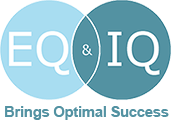The importance of one’s IQ – Intelligence Quotient, is well understood. EQ – Emotional Quotient (also known as “EI”) is widely referred to as Emotional Intelligence, and requires equal attention.
SEL (Social Emotional Learning) is a learning method to support moving toward one’s EQ potential.
Many are consumed with IQ achievements – whether it’s students’ GPA, where they were accepted to college, or a professional’s work credentials. Interestingly, the more one taps into their EQ (which opens up the brain functioning of the pre-frontal cortex), it allows them to optimize their IQ.
The EQ concept goes back to the 1930’s when psychologist Edward Thorndike described “social intelligence” as the ability to get along with other people. Over the years, the terminology evolved into “emotional intelligence” with dedicated theorists, psychologists, and researchers developing a greater depth and understanding of EQ.
In 1990, Peter Salovey and John D. Mayer were known as two of the leading researchers with regards to EQ. In their published article, “Emotional Intelligence” in the journal Imagination, Cognition, and Personality, they defined Emotional Intelligence as “the ability to monitor one’s own and others’ feeling and emotions, to discriminate among them and to use this information to guide one’s thinking and actions.”
To show the power of this movement, Daniel Goleman, an internationally known psychologist, wrote an important book on EQ In 1995. Goleman’s book, Emotional Intelligence was a New York Times bestseller, with over 5 Million copies in print worldwide in 40 languages.
SEL is a critical component to achieve EQ. Per www.casel.org – SEL is defined as:
“Social and emotional learning (SEL) is the process through which children and adults understand and manage emotions, set and achieve positive goals, feel and show empathy for others, establish and maintain positive relationships, and make responsible decisions.”
A current leading SEL expert, Maurice J. Elias, Ph.D., Director, Rutgers Social-Emotional and Character Development Lab (www.SECDLab.org) explains:
EQ can be broken down into three main skill areas:
- Self-awareness and self-management: the ability to assess and know one’s own emotions, values, and capabilities (both strengths and weaknesses); the ability to cope with emotions and maintain self-control; the ability to persevere to achieve a goal.
- Social awareness and relationship skills: the ability to understand others and empathize with an awareness of individual and group similarities and differences; the ability to communicate effectively, both perceiving others’ messages and expressing oneself; the ability to work cooperatively with others.
- Responsible decision-making and problem-solving: the ability to establish positive goals; the ability to implement effective behaviors to achieve those goals; the ability to resolve interpersonal conflicts constructively.
Fortunately, comprehensive evidence-based SEL programs to support EQ continue to grow around the world, and goes beyond the teachings in the classroom. SEL curriculum also integrates the importance of school climate and communities at large.
To learn about the SEL advocacy, research and policy initiatives that experts are working on, please visit:
http://www.casel.org
https://sel4us.org
http://nationathope.org
